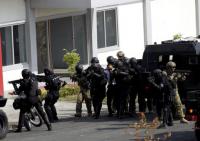-
Feds: We can read all your e-mail, and you’ll never know

Fear of hackers reading private e-mails in cloud-based systems like Microsoft Outlook, Gmail, or Yahoo has recently sent regular people and public officials scrambling to delete entire accounts full of messages dating back years. What we don’t expect is our own government to hack our e-mail — but it’s happening. Federal court cases going on right now are revealing that federal officials can read all your e-mail without your knowledge. For example, in the case of U.S. v. Ravelo, pending in Newark, New Jersey, the government used a search warrant to download the entire contents of a lawyer’s personal cellphone – more than 90,000 items including text messages, e-mails, contact lists, and photos. When the phone’s owner complained to a judge, the government argued it could look at everything (except for privileged lawyer-client communications) before the court even issued a ruling. The judge in Ravelo is expected to issue a preliminary ruling on the feds’ arguments sometime in October. All Americans should be watching carefully to what happens next in these cases – the government may be already watching you without your knowledge.
-
-
Swiss approve broader surveillance powers for the government
A majority of 65.5 percent of Swiss voters have on Sunday approved a new surveillance law, agreeing with the government’s argument that that the country’s security services needed more powers in an increasingly dangerous world. Relative to other European countries, the Swiss police and intelligence agencies have had limited investigative powers. For example, the law which was updated on Sunday had banned phone tapping and e-mail surveillance under any circumstances.
-
-
Number of terrorists in U.K. jails peaks
The number of terrorist held prisoner in British jails 152 — fifty higher than five years ago, according to the latest set of quarterly reports from the Home Office. The reported record number of terrorist prisoners come one month after the Acheson review, which said that past complacency had allowed Islamic extremism to flourish in British jails, and two weeks after the government has launched a new initiative to build specialized high-security units in jails to separate the most subversive inmates from the general jail population.
-
-
Che Guevara era ends: FARC ratifies Colombia peace accord, ending 52-year war

Colombia’s FARC rebel group on Thursday voted unanimously to approve a peace deal with the government, officially declaring an end to the 52-year war. The insurgent group now prepares to transform itself into a new political party. The title of one article offering an analysis of the momentous even captured it all: “Che Guevara era closes as Latin America’s oldest guerrilla army calls it a day.” “This is an agreement with the last of the great guerrilla movements that emerged in the context of the cold war,” says one expert. “There might be other episodes, but strategically the armed project, the armed utopia, is closing its cycle with FARC.”
-
-
Will Colombia’s peace deal get the people’s vote?
On 26 September 2016, the Colombian government and the Fuerzas Armadas Revolucionarias de Colombia (FARC) will sign a formal agreement to end fifty years of conflict. The agreement is precedent-setting in several ways. It will be the first negotiated end to a civil conflict in the world under the new international standards of the 2002 Rome Statutes to hold accountable armed combatants who commit grave human rights abuses. It will also be the first peace process to have included victims at the negotiating table. In another innovation, it extends the special justice system to other sectors of the society beyond the FARC, such as civilian sponsors and financiers of paramilitary forces, as well as the government’s security forces. Finally, it will be the first end to a civil war that does not rely primarily on amnesty for all sides, but instead provides new forms of restorative justice. This is a compromise effort to reach peace while also holding perpetrators of human rights abuses accountable, and I believe could serve as a model for the world.
-
-
Abnormalities found in drinking water in Texas’s Eagle Ford Shale region
Chemists studying well water quality in the Texas’s Eagle Ford Shale region found some abnormal chloride/bromide ratios, alongside evidence of dissolved gases and sporadic episodes of volatile organic compounds, all indicative of some contamination from industrial or agricultural activities in the area.
-
-
Adviser to EU top court recommends removing Hamas, Tamil Tigers from EU terror watch list
The advocate-general of the European Court of Justice on Thursday advised the court that Hamas and the Tamil Tigers should be removed from the EU’s terror list. He emphasized that the recommendation is the result of his conclusion that the EU governments followed an improper procedures when they decided to add the two groups to the organization’s terror watch list.
-
-
Radioactive wastewater enters Florida major aquifer after huge sinkhole opens up below fertilizer plant
At least 980 million liters of highly contaminated water — including radioactive substances – has leaked into one of Florida’s largest sources of drinking water. The leak was caused by a huge sinkhole which opened up beneath a fertilizer plant near Tampa. The sinkhole caused highly contaminated waste water to pass into an aquifer which supplies much of the state. The waste water contained phosphogypsum, a by-product of fertilizer production, which contains naturally occurring uranium and radium. the Floridan aquifer aquifer underlies all of Florida and extends into southern Alabama, Georgia, and South Carolina, supplying groundwater to the cities of Tallahassee, Jacksonville, Gainesville, Orlando, Daytona Beach, Tampa, and St Petersburg.
-
-
Assessing the risk from Africa as Libya loses its chemical weapons
Libya’s remaining chemical weapons left over from the Gaddafi regime are now being safely disposed of in a German facility. This eliminates the risk of them falling into the wrong hands. But can these same hands acquire weapons of mass destruction from the rest of Africa? The disposal of Libya’s chemical weapons has lowered the risk of weapons of mass destruction in Africa. But we have seen how far non-state actors are willing to go to either produce or steal such weapons. For example, analysts envision militants known as “suicide infectors” visiting an area with an infectious disease outbreak like Ebola purposely to infect themselves and then using air travel to carry out the attack. Reports from 2009 show forty al-Qaeda linked militants being killed by the plague at a training camp in Algeria. There were claims that they were developing the disease as a weapon. The threat WMD pose cannot be ignored. African countries, with help from bilateral partners and the international community, have broadened their nonproliferation focus. They will need to keep doing so if the goal is effectively to counter this threat.
-
-
NIST’s regional approach to addressing U.S. cybersecurity challenge
NIST has awarded grants totaling nearly $1 million for five projects that are taking a community approach to addressing the U.S. shortage of skilled cybersecurity employees. The NIST-led National Initiative for Cybersecurity Education (NICE), a partnership among government, academia, and the private sector, will oversee the grants as part of its mission to support cybersecurity education, training, and workforce development.
-
-
Cleaning concrete contaminated with chemicals
In March 1995, members of a Japanese cult released the deadly nerve agent sarin into the Tokyo subway system, killing a dozen people and injuring a thousand more. This leads to the question: What if a U.S. transportation hub was contaminated with a chemical agent? The hub might be shut down for weeks, which could have a substantial economic impact. Craig Tenney, a chemical engineer at Sandia National Laboratories, is looking for better ways to clean contaminated concrete to reduce that impact.
-
-
MI6 to recruit hundreds more staff in response to advances in digital technology,
MI6, the U.K.’s overseas intelligence service, is set to recruit hundreds more digital specialists over the next four years in response to the ever-growing digital threats and challenges posed by advancing digital technology. MI6 employs 2,500 people, and the agency focuses on intelligence-gathering and operations outside the United Kingdom. MI5 is in charge of security within the United Kingdom (James Bond worked for MI6). In a rare public appearance, Alex Younger, the head of MI6, said of terrorism: “regrettably, this is an enduring issue which will certainly be with us, I believe, for our professional lifetime.”
-
-
Texas threatens to withdraw from refugee resettlement program

As part of its ongoing fight to keep Syrian refugees out of the state, Texas is threatening to withdraw from the nation’s refugee resettlement program if federal officials refuse to “unconditionally approve” a state plan requiring additional vetting of relocated people.
-
-
ISIS fired chemical shells at U.S., Iraqi troops near Mosul
U.S. defense officials say that on Tuesday ISIS has fired a shell containing mustard agent at the Qayarrah air base south of Msoul. U.S. and Iraqi troops use the base for operations against the Islamist group. No U.S. or Iraqi troops were hurt, and none has shown symptoms of exposure. One official told CNN that the agent had “low purity” and was “poorly weaponized.” A second official described it as “ineffective.”
-
-
Psychology expert: Why extremists use violence in their quest for significance

The recent attack in New York, which left 29 persons wounded, the bombings in New Jersey and the knife attack in Minnesota serve as a grim reminder that this year of blood and fury carries on. Though incomprehensible to most, these instances of seemingly rampant violence have a compelling rhyme and reason to the perpetrators. They carry out their carnage in full premeditation and after careful preparation. Theirs isn’t crime of passion, or case of temporary insanity. It is, instead, a deliberately chosen path grounded in a confidently held worldview. Based on my research, violent extremism typically requires the presence of three elements that jointly create the terrorist mindset: what I call the “N-triad of radicalization.” The three N’s are need, narrative, and network. Though it might appear random and haphazard, the violence on streets of the world’s cities is psychologically coherent. The combination of individuals’ needs, narratives, and networks forms a combustible mixture ready to explode in mayhem and murder. Taking all three elements into account may offer a reasonable, science-based approach to preventing and reversing radicalization. It may be key to interventions and programs that can stem the tide of violent extremism that seriously threatens the world’s security and stability.
-
More headlines
The long view
Preventing Another 'Jan. 6' Starts by Changing How Elections Are Certified, Experts Say
The 2024 presidential election may be a rematch between President Joe Biden and former President Donald Trump, but preventing a repeat of Jan. 6, 2021 — when false claims of a stolen election promoted by Donald Trump and his allies led to an insurrection at the U.S. Capitol —will be top of mind this election year. Research finds broad support among public for nonpartisan certification commissions.
States Rush to Combat AI Threat to Elections
This year’s presidential election will be the first since generative AI became widely available. That’s raising fears that millions of voters could be deceived by a barrage of political deepfakes. Congress has done little to address the issue, but states are moving aggressively to respond — though questions remain about how effective any new measures to combat AI-created disinformation will be.
Chinese Government Hackers Targeted Critics of China, U.S. Businesses and Politicians
An indictment was unsealed Monday charging seven nationals of the People’s Republic of China (PRC) with conspiracy to commit computer intrusions and conspiracy to commit wire fraud for their involvement in a PRC-based hacking group that spent approximately 14 years targeting U.S. and foreign critics, businesses, and political officials in furtherance of the PRC’s economic espionage and foreign intelligence objectives.
European Arms Imports Nearly Double, U.S. and French Exports Rise, and Russian Exports Fall Sharply
States in Europe almost doubled their imports of major arms (+94 per cent) between 2014–18 and 2019–23. The United States increased its arms exports by 17 per cent between 2014–18 and 2019–23, while Russia’s arms exports halved. Russia was for the first time the third largest arms exporter, falling just behind France.
LNG Exports Have Had No Impact on Domestic Energy Costs: Analysis
U.S. liquified natural gas (LNG) exports have not had any sustained and significant direct impact on U.S. natural gas prices and have, in fact, spurred production and productivity gains, which contribute to downward pressure on domestic prices.
Don’t Buy Moscow’s Shameless Campaign Tying Biden to Its Terrorist Attack
Russia has offered many different explanations to the ISIS-K’s 22 March 2024 terrorist attack at the Crocus City Hall in Moscow, but the most recent explanation offered by Russia is the most audacious yet: Russia now charges that the Ukrainian energy company Burisma financed the attack. Burisma is at the center of an effort by a congressional committee to impeach President Biden, but the case has all but collapsed. Hunter Stoll writes that Russia’s disinformation and propaganda apparatus appears to be searching for ways to keep Burisma in the news ahead of the U.S. presidential election.
